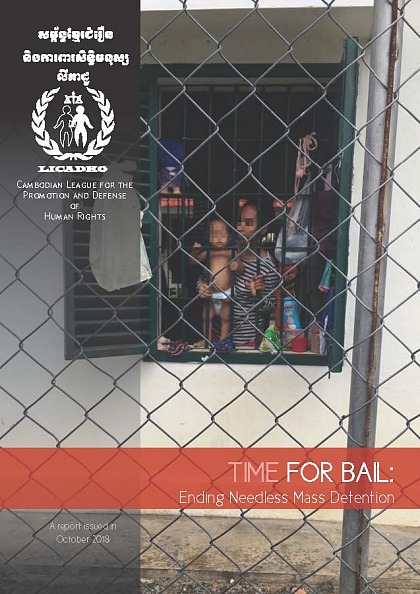Incarcerated Mothers and Pregnant Women: LICADHO Calls for Urgent Action
Published on 8 April 2019On 18 February 2019, Prime Minister Hun Sen urged the Ministry of Justice and Ministry of Women’s Affairs to review the situation of women detainees in pre-trial detention. Through a speech and a post on his official Facebook account, the prime minister said women detainees face many challenges, such as having children living outside of prisons with no support and being abandoned by their husbands.
LICADHO agrees with prime minister’s call for urgent action to address the needs of women in prison, specifically the situation of vulnerable populations – mothers with children and pregnant women in prison. This issue should be resolved through the use of existing legal measures, such as prioritising trials for women in pre-trial detention and expediting the processing of bail applications.
LICADHO has also written letters to the Ministry of Interior, Ministry of Justice and Ministry of Women’s Affairs asking them to answer the prime minister’s call for action and find a quick resolution to the plight of women pre-trial detainees using existing legal measures.
These measures were detailed in a October 2018 report from LICADHO titled Time for Bail: Ending Needless Mass Detention, which highlighted the situation of children, their mothers and pregnant women incarcerated in Cambodian prisons.
LICADHO has been monitoring prisons in Cambodia since 1993 and currently monitors 18 out of 28 Cambodian prisons. Under Cambodian law, children under the age of three are allowed to stay in prison with their mothers. Currently, there are 113 children and 38 pregnant women incarcerated in the 18 prisons monitored by LICADHO. This crisis is growing worse, as the number of children detained with their mothers has almost doubled since 1 January 2017.
These children and their mothers face multiple challenges, such as limited food, water, clothing and hygiene materials. These problems are made worse due to the use of excessive pre-trial detention and the under-utilisation of existing legal proceedings, such as bail applications.
LICADHO’s report issued the following recommendations, which would help alleviate the problems raised by the prime minister.
▪ All detainees who are eligible should be asked if they wish to apply for bail, especially in cases of vulnerable populations, such as women with babies and juvenile detainees. This will ensure children do not have to live in cramped prison cells, which has an adverse effect on their physical and mental development.
▪ Prioritise the bail hearings of cases of vulnerable populations, such as pregnant women and mothers with young children, so that they do not stay in pre-trial detention for lengthy and undetermined periods of time. This will help in the case of children over the age of three - unable to continue living with their mother in prison - so that they are not forced to enter institutionalised care. Also, it is documented that pregnant women are often not provided with pre- or post-natal care.
▪ Ensure that pre-trial detention is used appropriately and as a last resort, in accordance with the presumption of innocence.
▪ Ensure that proper consideration, in accordance with legal protections, is given to the personal circumstances of all charged persons, especially in cases of vulnerable populations such as pregnant women and mothers with young children and juvenile detainees, before making an order for detention.
▪ Ensure the 2014 pre-trial detention forms are used correctly, clearly explaining which of the six reasons for pre-trial detention apply to the case and containing a strong argument for the pre-trial detention decision.
▪ Ensure that every charged person has their pre-trial rights and protections upheld including access to adequate legal representation, being correctly informed of the charges against them and knowledge of the procedures regarding the application and granting of bail and the capacity to apply for bail, especially in cases of vulnerable populations such as juvenile detainees, pregnant women and mothers with young children. These proceedings should be explained clearly and implemented in a timely manner.
In addition, LICADHO recommends that the prosecutor general publish guidelines on how legal and judicial authorities should handle cases involving mothers and pregnant women to ensure that they are not incarcerated at such high rates in the future.
The above suggestions are the best methods of addressing the situation of mothers and pregnant detainees, and is in-line with Prime Minister Hun Sen’s announcement to prioritise the cases of women in prison. It is our hope that all pregnant women and mothers in prison with their children, currently serving pre-trial detention, be granted bail or have their trials completed before Khmer New Year.
For more information, please contact:
▪ Am Sam Ath, deputy director of monitoring and protection at LICADHO. Signal: +85510327770 (Khmer)
▪ Naly Pilorge, director at LICADHO. Signal: +85512214454 (English)
PDF: Download full statement in English - Download full statement in Khmer
MP3: Listen to audio version in Khmer
- Related Material
- Topics
- Children's rights Women's rights







